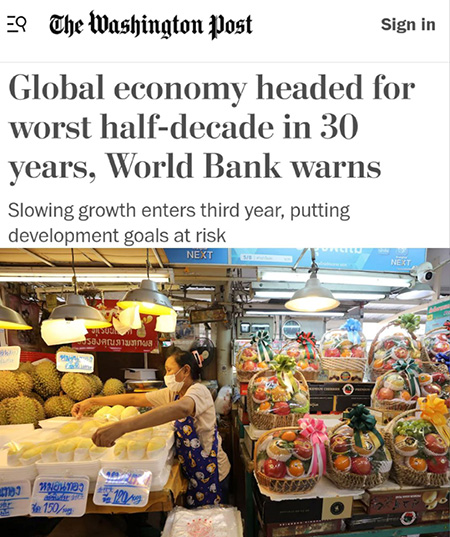
Slowing growth enters third year, putting development goals at risk, notes ‘The Washington Post’. The global economy will slow in 2024 for the third straight year and appears headed for its weakest half-decade since the early 1990s, the World Bank said Tuesday in its latest annual forecast.
While higher interest rates appear to be bringing inflation under control without the serious financial crisis or soaring unemployment that many had feared, the global economy’s overall performance is lagging, said Indermit Gill, the bank’s top economist.
After rebounding sharply in 2021 from the depths of the pandemic, the global economy grew by 3 percent in 2022, dipped to a 2.6 percent rate last year and is expected to post a tepid 2.4 percent this year, the bank said in its annual Global Economic Prospects report. Those rates lag the 3.1 percent average for the decade of the 2010s.
The continuing slowdown all but guarantees that world leaders will fail to meet the 2030 development goals that 193 members of the United Nations, including the United States, agreed to in 2015. Governments pledged to transform the global economy by the end of this decade by setting 17 ambitious aims, including eliminating extreme poverty, cutting greenhouse gas emissions nearly in half, boosting education for the poor and eradicating hunger.
In a quarter of the world’s developing countries, people are poorer today than they were before the pandemic, the bank said.
“When you look at the big picture, it’s not pleasant,” said Ayhan Kose, the bank’s deputy chief economist.
The bank’s forecast calls for the United States to grow at a 1.6 percent rate this year, roughly twice as fast as Europe or Japan. China is expected to grow by 4.5 percent, down from an estimated 5.2 percent last year as its post-covid reopening fades.
While bank economists expect a good-but-not-great year, they warned that conditions are more likely to disappoint than to produce a positive surprise. The war in Gaza — coupled with ongoing hostilities in Ukraine — could sideswipe global growth. Escalation of the fighting in the Middle East would probably send oil prices well above their current $75-per-barrel level, dampening growth and lifting inflation.
Attacks on shipping through the Red Sea have prompted cargo vessels to take the longer, costlier route around the southern tip of Africa. Over the 10 days ending Jan. 2, the volume of trade through the Suez Canal, which connects the Red Sea to the Mediterranean, dropped 28 percent, according to the International Monetary Fund.
Disruption to that key shipping lane, if it persists, could put upward pressure on prices in the United States and elsewhere.
read more in our Telegram-channel https://t.me/The_International_Affairs

 11:29 15.01.2024 •
11:29 15.01.2024 •






















